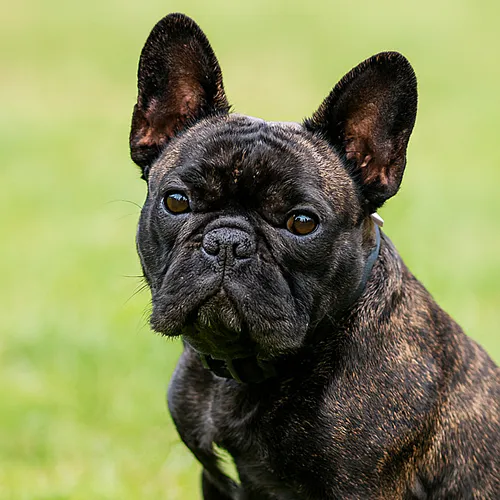
The French Bulldog is one of the most recognisable small breeds in the world, known for its compact build, bat-like ears, expressive face and HUGE personality!
The story of the French Bulldog begins in England during the 19th century. It was developed as a smaller version of the Bulldog, bred by lace workers in Nottingham who wanted a compact companion that could live comfortably in small homes. When many of these workers moved to France during the Industrial Revolution, they took their small Bulldogs with them. In France, the breed was refined further, with selective breeding producing the upright ears and lighter build that we see today.
By the late 1800s, the French Bulldog had established itself as a fashionable companion in Paris, particularly among artists, writers and society figures. The breed’s popularity spread to other countries, including the United States, where it was recognised by the American Kennel Club in 1898. Over time, the breed experienced fluctuations in popularity but saw a major revival in the late 20th and early 21st centuries, becoming one of the most sought-after dogs in both the UK and US.
A typical French Bulldog stands about 28 to 33 centimetres at the shoulder and weighs between 8 and 14 kilograms. Its body is muscular and sturdy, with a broad chest and short, smooth coat that comes in a variety of colours including brindle, fawn, cream and pied. The head is large and square with a short muzzle, and the ears are set high and carried erect. The eyes are round and dark, giving the breed its trademark alert and often comical expression.
French Bulldogs are generally well suited to families with children. They are affectionate, playful and tend to form strong bonds with their owners. Their small size and moderate exercise needs make them manageable for households without large gardens, and they adapt well to apartment living. They are usually patient with children, though as with any breed, interactions should be supervised to ensure both dog and child are safe and comfortable. Their sociable nature also means they often get along with other dogs and even cats, provided they are introduced properly.
The French Bulldog needs a moderate amount of maintenance. Its short coat requires only weekly brushing to remove loose hair, but its facial folds need regular cleaning to prevent irritation or infection. The breed is prone to shedding, though not excessively, and benefits from routine nail trimming, ear cleaning and dental care. Exercise needs are modest, with daily walks and some playtime indoors or in a secure garden usually sufficient. Care must be taken in hot weather, as their short muzzle makes them prone to overheating.
Health is an important consideration for anyone thinking of owning a French Bulldog. The breed is brachycephalic, meaning it has a shortened skull shape that can cause breathing difficulties. This can lead to issues such as snoring, noisy breathing and, in severe cases, respiratory distress. Other common health concerns include hip dysplasia (where the ball-and-socket hip joint doesn't form correctly, leading to a loose or unstable hip that can lead to dislocation, pain and arthritis), patellar luxation (a condition where the kneecap (patella) dislocates from its normal groove in the thigh bone (femur), causing pain, limping and an inability to extend the knee), skin allergies and spinal disorders such as intervertebral disc disease. Eye problems, including cherry eye and cataracts, can also occur. Responsible breeders screen for these conditions and avoid breeding dogs with severe issues. Owners can help by maintaining a healthy weight for their dog, avoiding excessive exercise in hot weather and scheduling regular veterinary check-ups.
The French Bulldog’s popularity has soared in recent years. In the UK, it has consistently ranked among the top three most registered breeds with The Kennel Club, while in the US it has reached the number one spot in the American Kennel Club rankings. This demand has unfortunately led to irresponsible breeding and illegal imports, so prospective owners should take care to source their puppy from reputable breeders or consider adopting from rescue organisations.
Despite their health challenges, French Bulldogs remain beloved for their affectionate nature, adaptability and distinctive looks. They thrive on human companionship and are happiest when included in family life. Their manageable size, moderate exercise needs and generally friendly temperament make them a good choice for many households, provided their care requirements are understood and met.
For those willing to invest the time and attention needed to keep them healthy, the French Bulldog offers years of loyalty, amusement and companionship. Whether curled up on the sofa or trotting proudly down the street, this small but sturdy dog has a way of capturing hearts wherever it goes.
